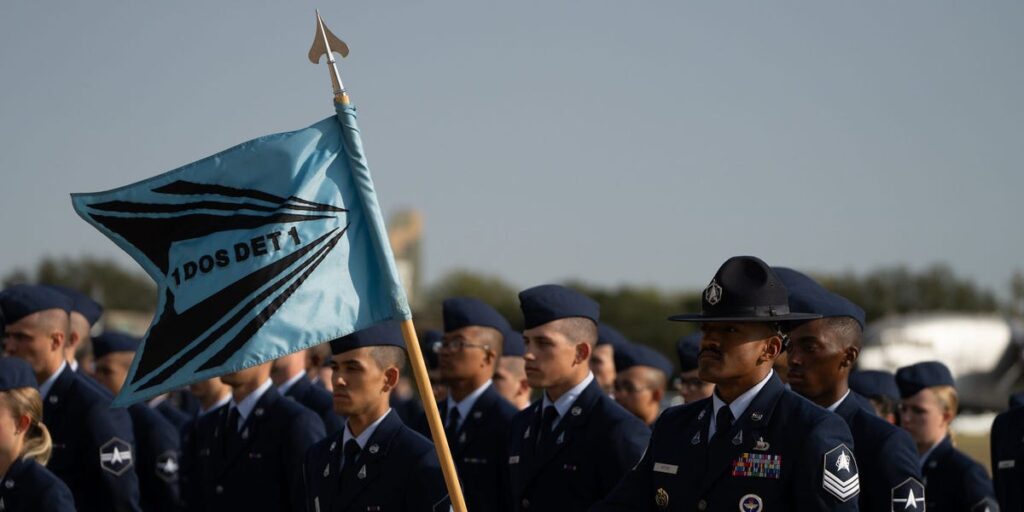- The US Space Force needs a “warfighting ethos” to compete with China in space, a new report has said.
- Failure to adapt could threaten the force’s long-term chances of success in the space domain, it said.
- The Space Force also lacks a clearly defined role and resources, the authors said.
The US Space Force needs a change in mindset and increased funding to compete with China in the space domain, two retired US colonels argued in a new report for the Mitchell Institute for Aerospace Studies.
The report, which was released earlier this week, summarizes the findings and recommendations from a two-day workshop held in October at the Mitchell Institute’s Spacepower Advantage Center of Excellence.
The event brought together 55 space experts to examine the Space Force Chief of Space Operations’ theory of success — called “Competitive Endurance” — against a set of potential crises over the next 25 years, including the Russian deployment of a nuclear antisatellite weapon and an attempted Chinese space blockade.
The workshop found that the role of the Space Force was not well understood by many Americans and that it lacked resources and a “warfighting ethos,” which the authors of the new report said threatened its long-term chances of success against China in the space domain.
“Systemic issues exist within the Space Force and Department of Defense that threaten the success of the Space Force in a long-term competition with China,” Charles Galbreath, a retired US Space Force colonel, and Jennifer Reeves, a retired US Air Force colonel, wrote.
“Chief among these are: inadequate authorities and resources, a lack of clearly defined and understood roles and missions, and the need for increased warfighting ethos.”
Drawing on the workshop’s findings, the authors, both senior fellows at the Mitchell Institute, called on Congress to increase funding to the USSF and loosen policy restrictions to allow the deployment of offensive and defensive weapons, which they said would enable the force to “create a stronger posture, capable of deterring hostile actions and conflict.”
They also urged the force to develop educational and training programs that aimed to “foster an assertive, warfighting culture,” adding that Space Force members — known as Guardians — “must see themselves as warfighters and project a war-winning ethos.”
While Galbreath and Reeves praised the “three tenets of Competitive Endurance” — avoiding operational surprise, denying first-mover advantage, and undertaking responsible counter-space campaigning — they said the theory did not “normalize space as a warfighting domain” or allow Guardians to “pursue victory and space superiority,” which they said made it difficult for the public and Congress to grasp its military importance.
“If this loophole is not addressed, the Space Force and U.S. Space Command could find itself in a death spiral of waning support and funding, ultimately precluding the fielding of capabilities and conducting of operations necessary to secure U.S. interests in space,” they added.
A Space Force spokesperson told Business Insider that “as China and Russia accelerate the development of counter-space capabilities, the need for a well-resourced Space Force has never been more critical.”
“Our Guardians remain committed to ensuring space superiority while safeguarding the long-term stability and sustainability of the domain,” they said.
Maj. Gen. Timothy Sejba, commander of Space Training and Readiness Command (STARCOM), said in 2023 that a warfighting mindset was vital to the USSF’s work.
Speaking to attendees at the Air & Space Forces Association’s 2023 Air, Space & Cyber Conference, Sejba, then Brigadier General, said that STARCOM’s mission was to instill the warfighting mindset in every Space Force recruit.
“Even though the Space Force is only four years old, we’ve built the warfighting mindset for almost 40 years,” he said, adding that he thought it was “critical” for the force to train “like we potentially have to fight in the future.”
“I think that exists in other domains and other services, but it’s one that we just haven’t necessarily had to put into place for space in the past,” he added.
Officials have long warned of growing international threats facing the US in the space domain.
In an interview with Politico in October, Gen. B. Chance Saltzman, the Chief of Space Operations, said China was developing counter-space capabilities at a “mind-boggling” pace and was of particular concern for the US.
John Plumb, a former assistant secretary of defense for space policy, also warned in 2023 of the increasing quantity and quality of global counter-space threats.
Plumb pointed to China fielding ground-based counter-space weapons and Russia developing its own systems designed at “degrading and denying US space-based services.”
“Our competitors have watched us, they have learned from us, they’ve stolen from us, and they have developed capabilities to hold us at risk. But they are not ready for us. They’re not ready for us today,” he said.
Read the full article here


